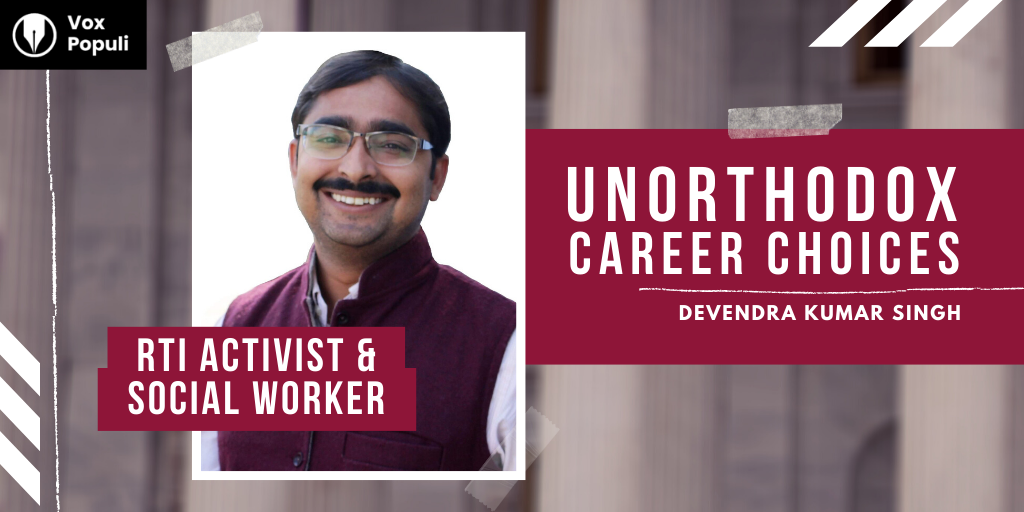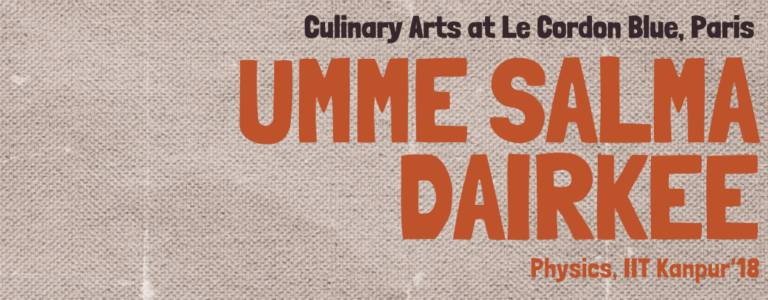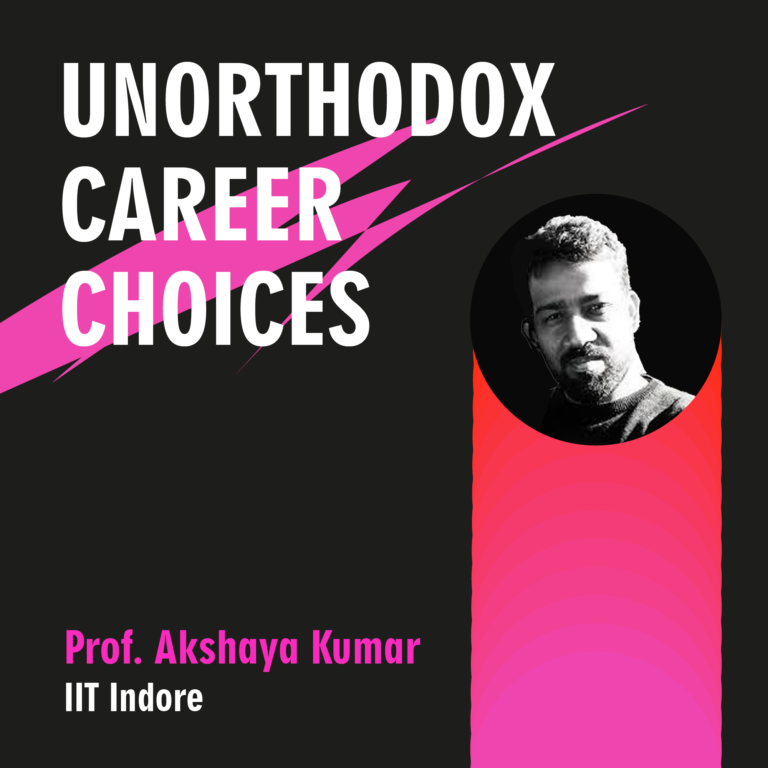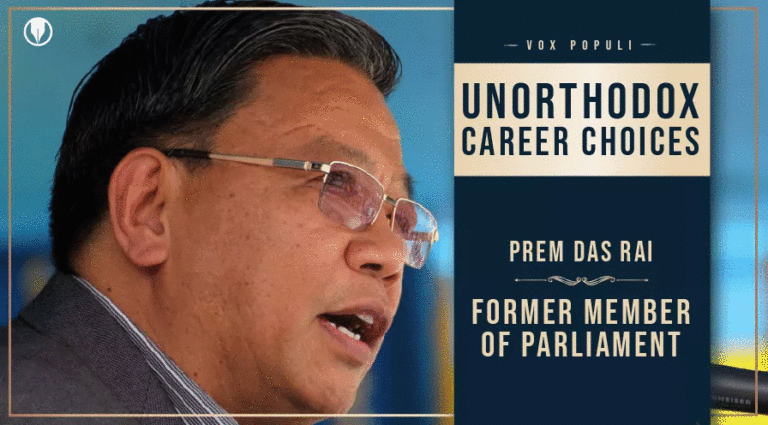Vox Populi brings you the seventh edition of the series Unorthodox Career Choices. We interview people who have taken a leap of faith and bring their stories to you. This edition brings you the story of Devendra Kumar Singh, an alumnus of IITK who completed his M.Tech in 2011. He is an RTI activist and a social worker. He left his engineering job in 2013 and has been since spreading awareness about RTI and helping poor people use this powerful act to fight various frauds. Do give it a read to know more about his journey and how IITK affected his career choice.
After doing B.Tech. and M.Tech. in civil engineering, what moved you to choose this unconventional path? What aroused your interest in law, and specifically RTI?
While doing B.Tech at IET Lucknow in 2007, I came to know about RTI for the first time by reading the lecture papers delivered by Arvind Kejriwal (back then, A.K. was the founder of the NGO Parivartan) as 23rd Kelkar Alumni Lecture in IITK on 25th March 2006. I understood from the papers that it is the remedy for all the corruption in the country. Whenever one of my family members applied for their passport, a policeman used to extort money from my family. I applied for a passport and decided that I will not give a single penny to anyone and use RTI instead, and it actually worked! RTI works beautifully but only a few know about it. Initially, I helped a few people and gradually people started knowing about me and my RTI activism. So, my studies and RTI awareness programs worked parallelly.
After getting a degree from IIT Kanpur, I joined an MNC. I worked in Noida for 2 years as a highway engineer. The work was comfortable. This was the time of the Anti-corruption movement. I got very interested in it. In 2012-13 my company faced an economic slowdown due to lack of government projects. So, we started getting less work. Before resigning from my job in October 2013, I was sitting idle in my office and getting a salary. After I resigned, I came back to Kanpur and started spreading awareness about RTI. I decided to not work in any engineering firm.
From 2014 to 2017, I worked for the poor and helped others in their hard-earned money lost in banking frauds among other problems. That is when I realized that not everything can be solved by RTI. Seeing this, I started trying to contact advocates who would work for free for the poor because I had no money on me and finally in 2017, I decided to study law myself.
How did your friends and family react to you leaving your job and choosing an unorthodox career?
They were not at all happy. They were worried about how I would get the money, how I would survive, and how I would start a family. I had already decided to not get married after leaving my job. I had seen a childhood of absolute poverty and did not have enough money to buy books for school. We were a family of four brothers and three sisters. My father was the only working member of the family. All of us four brothers got into different IITs and did their M.Techs from there. So, I decided to spend my life for society and let the other siblings live their lives and do whatever they want. I told my family that when we were poor, very few people came to help us. Thus, I am going to spend my life for the betterment of other poor people. It took a lot of time to convince my family but they did come around eventually. All the work that I was doing was being told to them as stories, in newspapers, on T.V., etc and at times, by the person affected themselves. They started supporting me and told me to be happy with what I was doing.
What is the process that you use to spread awareness among youth and in remote areas about RTI?
Social media is a good tool in the right hands. I use Twitter and Facebook for this purpose, to spread awareness about RTI. They tell others in need about me. I don’t know most of the people who come to me. At times, they come from faraway places like Raebareli and Meerut and we stay connected through Facebook and emails. We stay in constant touch and the only thing that matters to me is that people who need help should be given that. This awareness is getting stronger day by day.
How do you describe the feeling when someone comes to you with a problem and you are able to solve it using RTI?
That feeling is the most precious feeling. For me, that is the reward I am getting. People always say that they’re lucky since they received my help. I should say that for me, it is the smile on their face after their problem is solved, that becomes my ultimate reward.
Winning is certainly not always possible in the field of public work so how do you deal with the loss or the injustice? What is the mantra that keeps you going?
Winning is certainly not always possible. I have been successful with simple cases like ATM fraud. When the problem becomes complicated, for example, let’s say there is an unpaved road of 100m that needs to be constructed and paved, you cannot get it constructed using RTI. You can file a request in the respective department and then file an RTI to get information on what has been done about the request, but the only answer you’ll get is that they do not have funds. If the funds are available with the local MLA or the local MP, you can go to that authority, explain your problem to them but nothing is generally done about it. At such times, helplessness sets in, but doing nothing about it is not the solution. I believe that I should keep going in whatever capacity I can. I may not have done big things but I have done a lot of small things that matter. This example is quite personal as the roads in the area of Kanpur, where I reside, turn to ponds during every rainy season. I have tried everything but because those who hold power have become so powerful, they choose to do nothing. The only thing that can be done is not voting for them but sadly voting in India is not based on the candidate but the political party he/she belongs to.
Last year, I contested the by-elections of the Govindnagar seat of Legislative assembly and came fifth among nine participants, behind all the big parties. I knew I would not win but the point was to get myself heard, that people in power should work for the people. So my mantra is that failures aside, one should not stop and do whatever little they can do.
How important do you find RTI in a common person’s life? What are your views on the accessibility of RTI to a common person? How convenient do you find it?
RTI is necessary for those who aren’t being listened to by any of the government departments. Suppose you send a parcel to Kanpur by speed post on the 15th of June. It’s not delivered until 30th June. When you try to track it, the only information you could seek is that it was booked on June 15 at Delhi. There are no further updates. To search for the contact of the concerned post offices seems the only viable option and if you still don’t get a satisfactory response, you can now take the help of RTI. You just need to surf the website, fill a form with a payment of Rs. 10, and ask for the required information. RTI can’t only be used to fight corruption; it can also be used to collect any data that is under public authority.
You have worked on the ground, seen and met people who have no idea what the general policies are all about. What are your thoughts about that?
There’s a clause in the RTI act named Voluntary Disclosure or sometimes Mandatory Disclosure. Under this clause, information about new policies must be communicated through respective public domains and must be updated on a yearly basis. The idea is to put this kind of information in the public domain so as to reduce the number of RTI applications concerning related information.
In such a short duration of time, you’ve managed to achieve quite a lot in this field. You’ve even authored a book. Can you give us some insights from your book and why did you decide to write it?
I’ve given many public lectures about RTI. During these speeches, many cross-questions were raised. I thought that I should create a handbook comprising all such questions and answers. The book informs people about the procedure of filing an RTI clearly. A major portion of that book is dedicated to what a law code says about the provisions and the popular words used during the RTI process. During one of my cases, I was withheld from the information by the use of technical jargon. I could figure out the illegitimacy only because I’d had enough knowledge of RTI and law. I’ve focused on these kinds of issues while writing the book. My book titled “Right to Information Act …in simple words” is designed for those who have heard about RTI but never filed one because they don’t know how to get the information and efficiently write an RTI application. I have published it on Amazon and is available in Hindi as well as in English, in both paperback and ebook formats.
After completing your law degree, what are your future goals? Where do you see yourself in 10 years?
In 10 years, I see myself as a working lawyer, advocate going into litigation, charging those who can pay and giving service for free to those who can’t pay. Along with that, helping people by spreading awareness among people about RTI. I’ve previously fought an election just to give them a message whatever they’re doing is not acceptable to us. I am not planning to get into politics, but if the need arises, I’ll enter into politics.
Now that you’re in the field of law, does the knowledge gained from your engineering days help you in any manner?
I see a striking similarity between law and mathematics. In mathematics, you need to understand the formulas and then understand which formula is to be applied where. While in law, you should know the provisions of the law, and which section will be applicable in a given case. For example – A client may come with a problem that my daughter’s in-laws are causing her troubles. You should know that the domestic violence act, the dowry act, etc are applicable in this case. Patanjali recently launched a medicine, coronil and they advertised it very well, but there’s a law formulated in 1954 on magic remedy and misleading advertisement, under which this is a crime. Marriage requires a pandit but divorce requires a law. Everything has a law associated with it. You’re studying in an IIT, so you’re being governed by the Indian Institute of Technology act. The laws about buying a property, written wills, maternity benefit act for employees, the sales law, etc are important to lead a normal life. So you need to have a basic knowledge of the law.
Looking back in your life till now, what do you think are some of the biggest lessons the society has taught you?
I am inspired by a Lord Milner quote – “If you believe a thing to be bad and if we have the right to prevent it, then it is our duty to try to prevent it and damn the consequences”. There were four subjects in my M.Tech at IIT Kanpur, 3 compulsory and 1 elective. My professor asked me to choose Finite Element Matter(FEM) as the elective. I didn’t like it, but the professor insisted on it and we had to reach a compromise which was to take a different course altogether. Next year, the professor was extra cautious and there was no option of an elective. All the juniors failed after the first test in that course. Thus they requested the subject to be changed and the professor forwarded that request to DPGC and I was a part of it at that time. According to the PG manual, the subject could be changed based on two conditions, that is, it has to be changed within 15 days or if the student had not done the prerequisites of the course. The FEM course taken by students didn’t fulfill both of these conditions. In the meeting, I raised this point. The professors started joking, “Ki jab hota nahi, tab lena hi nahi chahiye tha”. Because of this incident, my M.Tech thesis was affected and my graduation was delayed by 2-2.5 months which later affected my job joining date. So, if something wrong happens, you have to stop it and not look at the consequences.
Can you tell us about your stay at IITK? Are there any memories of the campus that you would like to share?
IITK was the best part of my life. When I got the admission, I saw that there’s a gym, swimming pool and a book club. I joined all three in the first month but as the workload increased, I left all of them except the book club. Since I’m from Kanpur, I used to go home on weekends. Professor used to be angry about this! (laughs). At IITK, there’s an online system for everything, like, opting form subjects, booking appointments in HC and checking results online. I haven’t seen this in any other IIT. In IITD, for the monthly stipend, you just have to show that you’re present. In IITK, you have to do a TA duty for 8 hours a week and work in labs every day. Even in research, you must work hard to get passed. I decided to join the Ph.D. program at IITK and even got selected, but then I remembered those 15 days when my degree got extended and I was in the lab for 15 days and didn’t even go to my hostel. So I decided not to join the program. The workload would’ve been too much.
What message would you like to give to the IITK community?
Since childhood, we yearn for security. We were told in high school as well as 12th to study well as those marks will be useful everywhere. I was told to study well in my B.Tech, to get a good job. Both my brothers had done an M.Tech, which created a psychological pressure on me to clear GATE. My father died 2 days before the GATE exam in 2008. That year I could not get a good enough rank to get into an IIT. Next year, I had even more pressure. I went for the campus placement and got a job to get that ‘security’ in life. Once you have that IIT tag, you’ve got that security. I’ve been part of this blind race, I did everything until then because I was running to meet the standards set by my family. My siblings did M.Tech, I did it too. They didn’t do LLB, I didn’t even know about it. They did CE, I did CE. After joining the job, I did what I wanted to do. So after getting this security, think about what your heart wants and then move in that direction. Even if you’ll fall in that direction, you’ll not fall too behind. This is the privilege of IIT students. Your mind and heart should be in the same place.
Credits- Aaryan Mehar, Abhimanyu Sethia, Aditi Bajpai, Ananya Gupta, Varun Soni
Edited by- Sarvesh Bajaj
Poster by- Raj Varshith Moora












